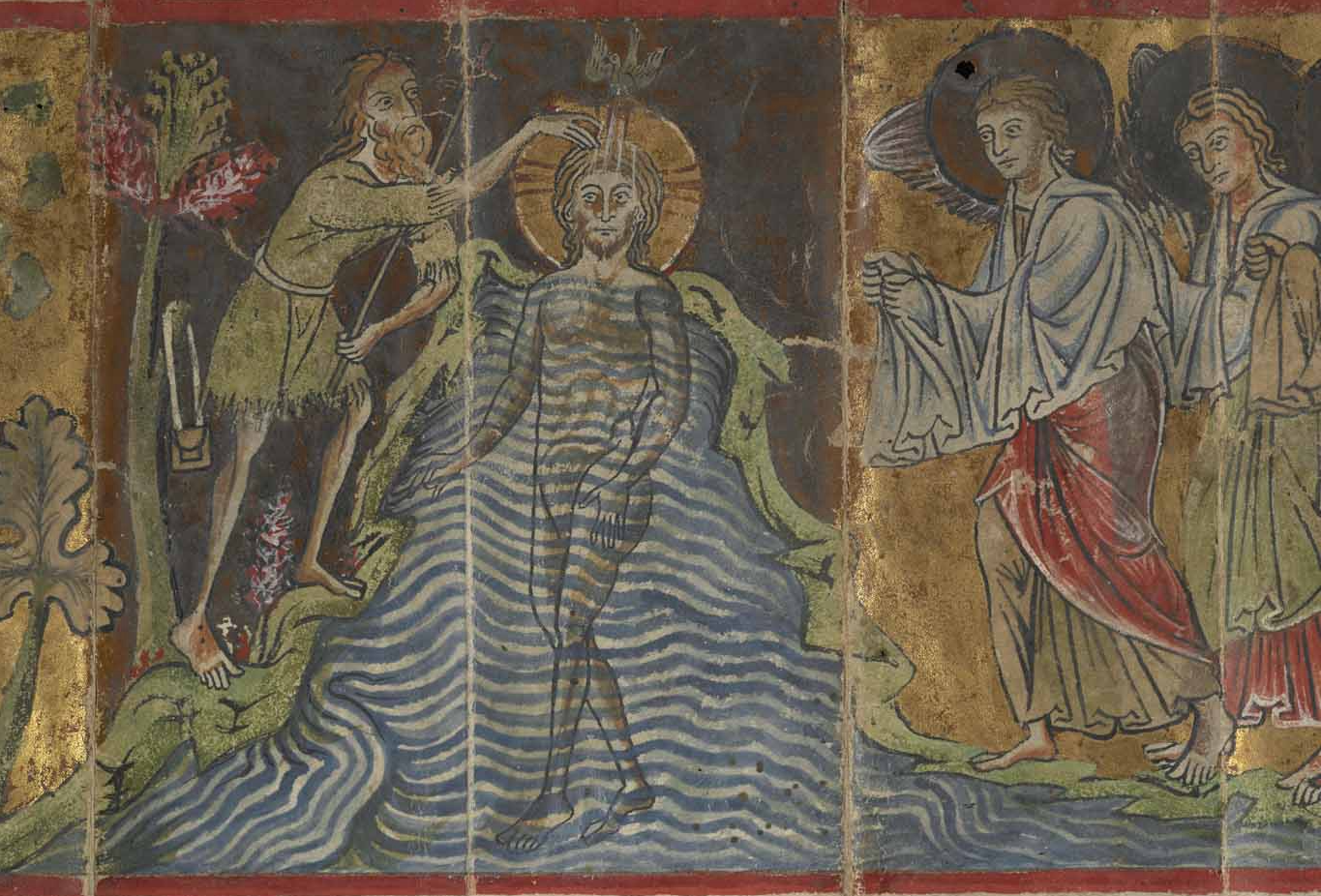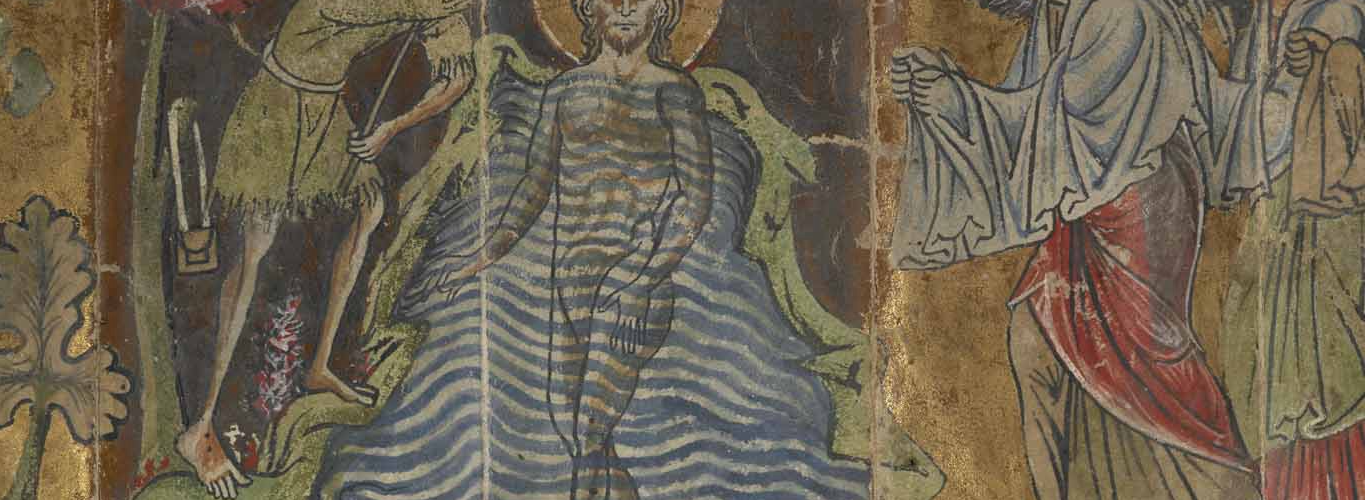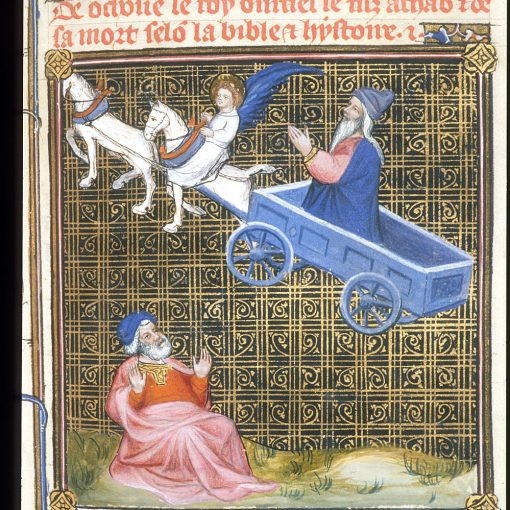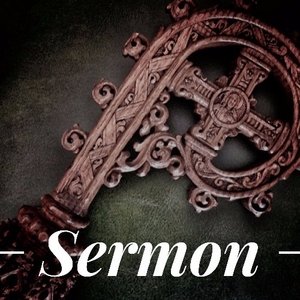Third Sunday of Advent (December 17, 2023)
Almost twenty years ago, in my first year as an honors college dean, we were having a dinner of our Advisory Board. During the drinks and hors d’oeuvres, I saw a board member that I had not yet met and went up and introduced myself to him. “Hello, I am Christian Brady,” I said. After telling me his name he asked, “So, do you do anything around here? Are you associated with the college or the university?” I was tempted to say, “I’m just taking drink orders, what would you like?” I didn’t, of course, and introduced myself as the new dean. It was clear to me that, for this individual, a person’s defined identity was very important.

Who are you? When someone asks you that question, how do you answer it? It probably depends upon context. I would think I might always begin with my name, “I am Christian Brady.” My name itself, however, has sometimes been a barrier. Growing up, my family called me (and still does) “Chris.” When Elizabeth and I got married and moved to England, everyone called me “Christian” and I quite liked that, so I thought to stick with it when I got my first job at Tulane University. That job was only a visiting position, however, and during the process of applying for the tenure track position, one of our adjuncts, a local rabbi, told me, “If you want the position, you should go by ‘Chris.’” So, for a long while I again reverted to “Chris.” But I like my full name, a name I share with an uncle, as it happens. Although my parents were faithful Christians, naming my brother and I were not statements of faith, but familial.
So, we will often start with our name, but where where we are at any given moment will likely dictate how we introduce ourselves. Most everyone in this congregation knows me only as Father Christian. When we are in social contexts, I am Elizabeth’s husband. In other contexts, I am Izzy’s or Mack’s father. If I am at a university function, I am the Dean of the Lewis Honors College. At conferences, I am a scholar of biblical and rabbinic literature, and in our diocese, I am Canon Theologian. We all have many names and titles, they are descriptive, and each tells you a little about me. They tell you to whom I am married, who my children are and what my job and vocation are. They do not really tell you anything about my real identity. Our English word, “identity,” means, “the quality or condition of being the same in substance, composition, nature… absolute or essential sameness” (OED). Our identity is not what we do, our titles or functions, it is our essence, who we are.
Who are you? Think about that a bit while we consider our Gospel this morning.
The Gospel of John is very interested in identities, specifically Jesus’. The Gospel opens with the famous, if somewhat cryptic words:
John 1.1 In the beginning was the Word, and the Word was with God, and the Word was God. 2 He was in the beginning with God. 3 All things came into being through him, and without him not one thing came into being. What has come into being 4 in him was life, and the life was the light of all people. 5 The light shines in the darkness, and the darkness did not overcome it.
John’s Gospel does not begin with Jesus’ birth, no angel appearing to Mary, no journey to Bethlehem, and no babe in the manger. John begins at the creation of the world. “In the beginning.…” John wanted to tell us who Jesus is, not just who his parents were or where he was born. In his opening words John tells us that Jesus was nothing less than God. This concept that Jesus was at once both human and divine has been a paradox that has challenged people from the moment Jesus said, “I and the Father are one.” Sadly, wars have been fought and lives lost in this debate, a debate that stems from our hubris to believe that we can understand all things. The Gospel of John simply asserts Jesus’ divinity as fact. He does not explain the mechanism and we should not need the explanation or comprehension. (After all, there are many things that we do not fully understand that remain true and real nonetheless.) The Word was God. Jesus is God. The Son and the Father are One.
Furthermore, John tells us, hinting at the Trinity, another mysterious truth, that God the Father works through the Son. “All things came into being through him, and without him not one thing came into being.” How? Don’t know. This is where we must realize we are reading theology, and we should read it on its own terms. Which is to say, the Gospel is conveying Truth, but it is not trying to explain the mechanism or even logic of it, the way we would expect if we were reading a scientific textbook or a modern philosophical treatise. So it is that the theology and poetry of John tells us that Jesus brings light and life. “What has come into being in him was life, and the life was the light of all people.”
This is who Jesus is, his identity. This is not a Jewish peasant, an itinerant preacher, or a miracle worker. He is the Word, he is God, he brings life and light. He is the Messiah who, in the words of today’s reading from Isaiah, brings liberty to the captives and release to the prisoners. A prophet is one who conveys the Word of God, he inspired, filled with the Spirit of God, with the words of comfort and direction. Through prophets, the God sent his Word to call his people out of Egypt and to call them back to obedience. Isaiah declares today that the “spirit of the Lord GOD is upon” him because the LORD has anointed (משח)” him to bring the news, the news of deliverance and freedom, “to proclaim the year of the LORD’s favor, and the day of vengeance of our God.” The Word of God is the declaration of the King of the World, the King of All Time, and a King’s declaration is fulfilled. It comes to be. Now, now in these last days, as the Gospels put it, “the Word became flesh and lived among us.” What had come through men and woman in occasional moments as inspired utterances, is now fully present in this world.
Jesus is not a messenger, an angel, nor a prophet, but the very being of God’s spirit dwelling in flesh. The divine dictation in human habitation.
John pursues this question of identity throughout his Gospel, not just of Jesus, but of all of us. In this morning’s reading we find a group of Jews asking John the Baptist who he is, the Messiah, Elijah, a prophet? They ask who he is, but John insists on replying to them by directing them to Jesus. “I am not the Messiah,” he replied, I am the one who prepares the way for the Messiah. Then who are you and why are you baptizing, they wanted to know.
John answered them, “I baptize with water. Among you stands one whom you do not know, the one who is coming after me; I am not worthy to untie the thong of his sandal.”
These men came out into the wilderness believing they were trying to find out who John the Baptist was. John the Baptist knew that who they were really seeking was the Messiah. So, whenever anyone asked John about himself, he redirected their attention to Jesus.
John the Baptizer knew his own identity and understood that he was the one who was preparing others to receive Jesus. John the Baptist had quite a following, he had disciples of his own and people coming out to hear him preach and be baptized by him. But he understood that he was merely the opening act and that his job was to lead others in the confession of their sins so that they would be ready to receive Jesus, the Word of God who would also be the Lamb of God who takes away the sins of the world (John 1:29).
John the Baptist prepared the way, declaring the Messiah was coming, and Peter declared to the World that Christ had come, Christ has risen, and that Christ would come again. But first, when Jesus is arrested and Peter waited in the courtyard during the trial, his identity was also questioned. “Are you not also one of his disciples?” he was asked. He denied it and said, “I am not.” (John 18:25-27). While that exchange occurred outside, inside Pilate asks Jesus who he is, “Are you the King of the Jews?” Jesus does not answer him directly, but urges him to discover for himself who he is, “Do you ask this on your own, or did others tell you about me?”
Who are you? What is your identity? When someone asks, “Who are you,” how do you answer that question? You may have noticed that when I opened this sermon, when that man asked who I was, I did not answer by saying that I am aChristian, a follower of Jesus. But maybe I should have. We all should, even if not in words.
I am not saying that the first thing you do when you meet someone is to give them a big toothy grin and ask, “Do you know Jesus as your personal lord and savior?” (Although that may be just the right thing to say at times.) Not all of us are called to be John the Baptist or Peter, so I am not making a direct analogy with their calling and ours. But we are allcalled as Christians to bear witness to the Light, to proclaim the Word of God, to direct people to Jesus. The fact that we are Christians should be who we are, our core identity, so much so that it is clear to others even without our saying a word. There will be people who think that they want to get to know you better when in fact what they really are seeking is to know Jesus through you.
I pray that about each of us, others may say nothing more than they said about John.
“He came as a witness to testify to the light, so that all might believe through him.”
Amen.





